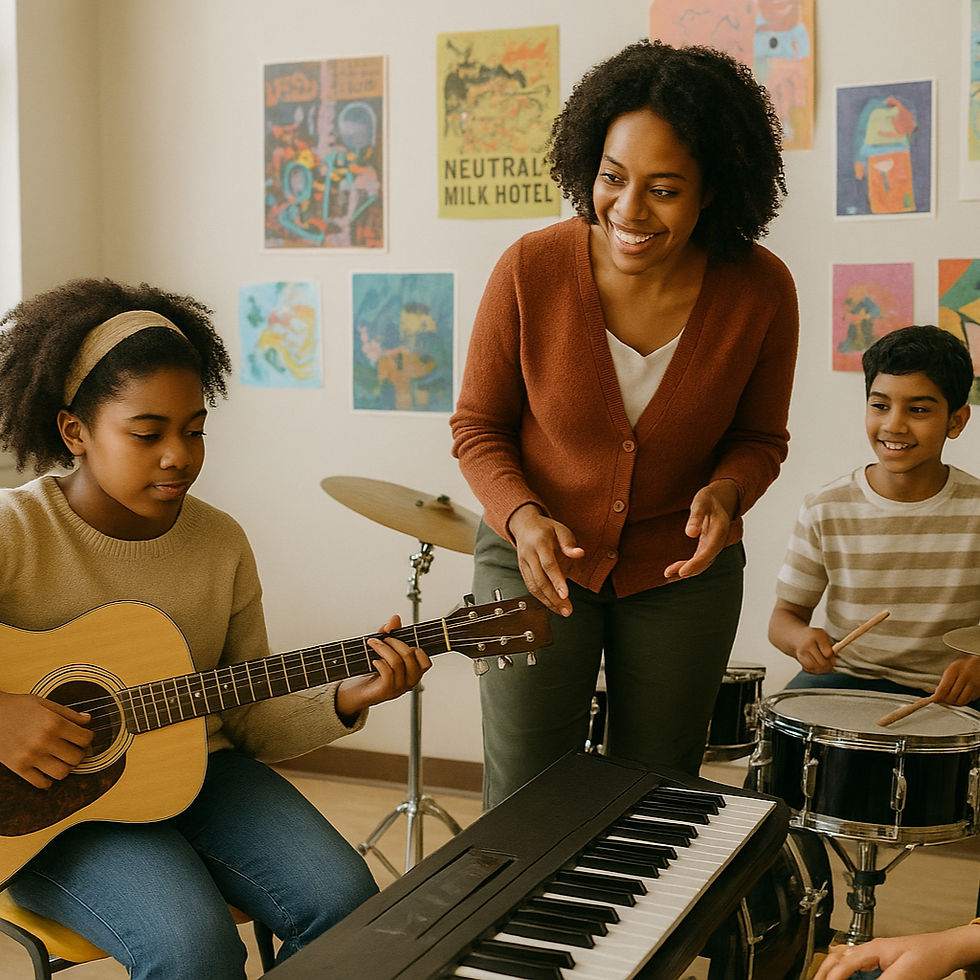
Photo- AI-Generated
Indie Music in Education: Empowering Young Artists and Inspiring Creativity
Exploring how indie music inspires young artists by breaking away from traditional music education norms.
16 August 2025
Indie music has always been about breaking down barriers, whether record companies, societal standards, or the music industry itself set them. Its attitude of freedom and creativity has spread to education, where schools, seminars, and youth programs use the indie ethos to inspire the next generation of artists.
Indie music education differs from typical music programs in that it emphasises uniqueness, experimentation, and personal voice rather than theory, classical training, or established genres. It's less about hitting the "right" notes and more about discovering your unique sound.
Breaking from Tradition
For decades, music education in schools was focused on structured courses, orchestras, and choirs, with a curriculum aimed at preserving traditions. While useful, these methodologies frequently provided little room for students interested in exploring new sounds, songwriting, or production.
Indie music presents an alternative. Indie, with its do-it-yourself (DIY) ethos and accessibility, inspires students to challenge conventions and experiment with instruments, digital technologies, and even unexpected sounds. It teaches young artists that music is about creating your style rather than fitting into a predetermined mould.
DIY Ethic in the Classroom
One of the distinguishing characteristics of indie music is its DIY approach. From self-recorded CDs to grassroots promotion, indie musicians have demonstrated that you don't need a large budget or a huge label to make meaningful art.
Teachers and mentors incorporate this attitude into the classroom by encouraging students to record their demos, design band posters, and even release music digitally. These projects not only encourage creativity but also teach children about entrepreneurship, demonstrating that art and freedom can coexist.
Technology & Accessibility
The rise of inexpensive recording tools and sites such as Bandcamp, SoundCloud, and YouTube has transformed how young musicians share their work. Indie-focused education takes advantage of these resources, teaching students how to compose, produce, and release their music with little more than a laptop and headphones. This accessibility democratises music-making, allowing students who cannot afford traditional classes or expensive equipment to nonetheless create and express their voices.
Building Confidence via Expression
Indie music frequently relies on vulnerability, raw lyrics, imperfect voices, and emotional honesty. When brought into school, it gives pupils a platform to express themselves authentically, without fear of being judged or having to sound "perfect." Writing and performing songs about personal experiences allows children to process their emotions, gain confidence, and connect with their classmates. It's no longer simply about studying an instrument; it's about discovering your identity through music.
Inspiring Collaboration
Collaboration is key to indie scenes, which include tiny venues, pooled resources, and community-driven creativity. In schools, this mentality is reflected in student-led bands, group songwriting workshops, and group concerts. Collaboration teaches pupils collaboration, adaptability, and respect for different perspectives, preparing them not only for music but also for life.
Future of Indie in Education
As more institutions recognise the value of creativity, independent music education expands. From after-school programs to university classes on independent music production, the trend is growing. Its influence assures that young artists are not constrained by formulas, but instead encouraged to pursue originality, vulnerability, and creativity.
In an era when mainstream music frequently reigns supreme, independent in education serves as a reminder that success is more than just charts and prizes; it is about creating something authentic. For children, learning through indie music means spreading the idea that their voices are important, no matter how small or strange they may appear.









